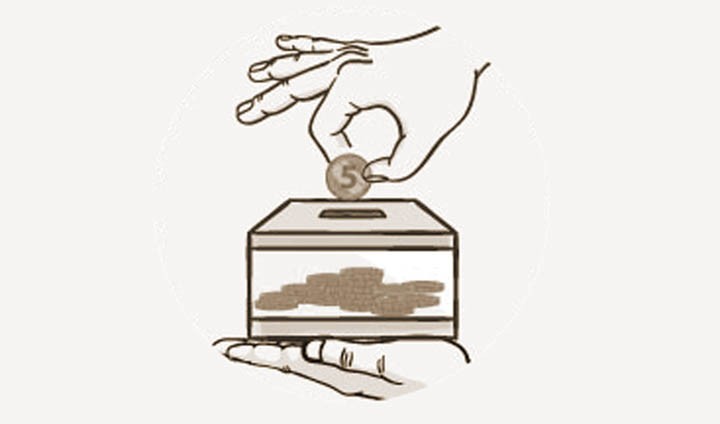
This Ramzan, efforts are on for safe charity through formal transactions but there is no mechanism in place to prevent donations to proscribed groups operating on the streets

As a majority of Muslims become generous with charity in Ramazan, there is little effort on the government part to campaign for careful donations to organisations and groups that have been vetted in advance.
"We come to know about the banned groups through press but they have presence in towns and cities and have sympathisers everywhere. Unless government comes up with a clear and transparent message to sensitise public, many people will continue to give money to such groups," says Sarfaraz Ahmed, a trader in Blue Area, Islamabad.
Since Financial Action Task Force (FATF), a global body to curb terror financing and money laundering, put Pakistan on its ‘Grey List’ and urged the state to "do more" to check financial support to notorious groups, Pakistan has been under pressure to disrupt financial activities of proscribed and extremist groups. Recently, the interior ministry has added ten organisations to the list of proscribed organisations.
These include Al Anfal Trust (Lahore), Idara-i-Khidmat-e-Khalq (Lahore), Al Dawatul Irshad (Lahore), Al Hamd Trust (Lahore and Faisalabad), Mosque and Welfare Trust (Lahore), Al Madinah Foundation (Lahore), Muaz bin Jabal Education Trust (Lahore), Al Eesar Foundation (Lahore), Al Rehmat Trust Organisation (Bahawalpur) and Al Furqan Trust (Karachi).
In 2017, National Counter Terrorism Authority (Nacta) introduced a model of safe charity laws and guidelines, and urged the provinces to legislate accordingly. After extensive efforts spread over many months, Punjab came up with the Punjab Charities Act 2018, which is meant to register and regulate charities, prevent misuse and diversion of funds to banned organisations. The law aims to "make effective provisions for the registration, administration and regulation of charities, fund-raising appeals and collection of charitable funds for charities and other institutions; and, for other purposes."
Moreover, Securities and Exchange Commission of Pakistan (SECP), which lists companies, has directed the non-profit organisations (NPOs) to keep complete record of the charities received. "The SECP directs NPOs to get charities through bank transactions for a safer and transparent charity," an SECP official tells The News on Sunday. The Nacta also signed a Memorandum of Understanding (MoU) with the Pakistan Centre for Philanthropy (PCP) to prepare a list of safe-charity organisations which is accessible on its website.
"We can see gradual efforts and some seriousness on the government’s part to counter extremist narrative and curtail finances of proscribed groups. Following the FATF, there is more realisation about this matter," former Nacta coordinator Ihsan Ghani tells TNS. "Practical efforts for safe charity began a couple of years ago."
He adds people give charity on three occasions -- "in Ramzan, in cash and kind; Eid ul Azha, in form of hides; and during the crop season, when-one tenth of the yield is given in charity."
He feels there is need for developing better institutional mechanisms for safe charity and there should be public awareness about such proscribed groups so that people do not donate money to them. "The government needs to tell public about the proscribed groups and why they are banned," he says.
A significant portion of charity in Ramzan goes to religious organisations and their affiliated relief and welfare bodies, followed by donations in health, education and social welfare sectors. Reportedly, in 2018, Pakistanis doled out about Rs173 billion in charities in Ramzan, which was 10 percent more than 2017. While a study, titled The state of Individual Philanthropy in Pakistan 2016, based on a sample survey of 10,000 households, estimated the value of annual givings at Rs240 billion in 2014, with zakat contributing merely 11 percent.
"There have been some good efforts by the government to promote safe charity. However, these efforts, mostly, are to check formal transactions of charity and donations and least to promote safe charity on the streets. A large number of people donate money to needy and organised groups operating in the streets," says Muhammad Amir Rana, Director Pakistan Institute for Peace Studies (PIPS). "There is need to sensitise public to promote safe charity at street level."
Normally, the government issues circulars to district administrations to encourage safe charity and to keep an eye on banned groups during the charity seasons. But, he adds, "There is no proper mechanism and manpower to monitor and implement this at street level and that is why this effort mostly remains on paper".
Rana urges the need to improve monitoring for safe charity at street level and design campaigns outside mosques etc. at the local level to improve situation on ground.